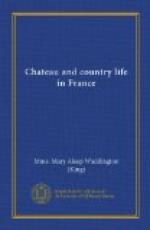I often think of one visit to a charming little Louis XV chateau standing quite on the edge of the forest—just room enough for the house, and the little hamlet at the gates; a magnificent view of the forest, quite close to the lawn behind the chateau, and then sweeping off, a dark-blue mass, as far as one could see. We were shown into a large, high room, no carpet, no fire, some fine portraits, very little furniture, all close against the wall, a round table in the middle with something on it, I couldn’t make out what at first. Neither books, reviews, nor even a photographic album—the supreme resource of provincial salons. When we got up to take leave I managed to get near the table, and the ornament was a large white plate with a piece of fly-paper on it. The mistress of the house was shy and uncomfortable; sent at once for her husband, and withdrew from the conversation as soon as he appeared, leaving him to make all the “frais.” We walked a little around the park before leaving. It was really a lovely little place, with its background of forest and the quiet, sleepy little village in front; very lonely and far from everything, but with a certain charm of its own. Two or three dogs were playing in the court-yard, and one curious little animal who made a rush at the strangers. I was rather taken aback, particularly when the master of the house told me not to be afraid, it was only a marcassin (small wild boar), who had been born on the place, and was as quiet as a kitten. I did not think the great tusks and square, shaggy head looked very pleasant, but the little thing was quiet enough, came and rubbed itself against its master’s legs and played quite happily with the dogs. We heard afterward that they were obliged to kill it. It grew fierce and unmanageable, and no one would come near the place.
* * * * *
I took Henrietta with me sometimes when I had a distant visit to pay; an hour and a half’s drive alone on a country road where you never meet anything was rather dull. We went one cold December afternoon to call upon Mme. B., the widow of an old friend and colleague of W.’s. We were in the open carriage, well wrapped up, and enjoyed the drive immensely. The country looked beautiful in the bright winter sunshine, the distant forest always in a blue mist, the trees with their branches white with “givre” (hoarfrost), and patches of snow and ice all over the fields.
For a wonder we didn’t go through the forest—drove straight away from it and had charming effects of colour upon some of the thatched cottages in the villages we passed through; one or two had been mended recently and the mixture of old brown, bright red and glistening white was quite lovely.




